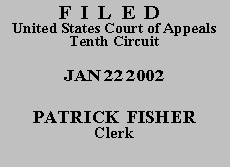

| DR. MARC PRATARELLI,
Plaintiff-Appellant, v. OKLAHOMA STATE UNIVERSITY BOARD OF REGENTS, Agricultural and Mechanical Colleges; DR. DAVID G. THOMAS; DR. MAUREEN SULLIVAN; DR. BRUCE CRAUDER, Defendants-Appellees. |
|
Plaintiff appeals the district court's grant of summary judgment to defendants on his state and federal claims arising out of his employment as an assistant professor in the Psychology Department at Oklahoma State University. Plaintiff also appeals the district court's award of costs to defendants, arguing that the cost award should be reversed along with the grant of summary judgment. We exercise jurisdiction pursuant to 28 U.S.C. § 1291 and affirm.
In his First Amended Complaint, plaintiff asserted two Title VII claims against the Board of Regents. First, he alleged that a female colleague sexually harassed him, thereby creating a hostile work environment, and that the administration failed to take timely action to correct the situation. Second, he alleged that certain administrators retaliated against him for reporting his colleague's sexual harassment. The district court denied plaintiff relief, concluding that plaintiff failed to establish the existence of a hostile work environment and, moreover, that the University took prompt and appropriate action as soon as he complained about the alleged harassment. The court also denied plaintiff relief on his retaliation claim, concluding that plaintiff failed to establish both that the University took any adverse action against him and that there was any connection between an adverse action and his reporting of the alleged harassment.
Plaintiff also asserted a claim under 42 U.S.C. § 1983 against three individual administrators, alleging that they deprived him of his property interest in being reappointed to a second term without due process. The district court denied plaintiff relief on this claim, concluding that plaintiff had no property interest in his continued employment with the University beyond his initial appointment.(1)
Finally, plaintiff asserted three state law claims. First, he asserted a breach of contract claim against the Board of Regents for not reappointing him. Having previously determined that plaintiff had no contract with the University beyond his initial appointment, the court denied relief on this claim. Second, plaintiff asserted a claim for wrongful discharge against the Board of Regents. He alleged that the failure to reappoint him violated Oklahoma public policy because it was a product of sexual harassment and retaliation against him. Again, having previously determined that plaintiff failed to establish either a sexual harassment or a retaliation claim, the court also denied plaintiff relief on this state law claim. Finally, plaintiff asserted a claim for interference with a contractual relationship against the three individual administrators for the roles they played in the reappointment process. The court denied relief on this claim, concluding that plaintiff had no contract with which the administrators interfered and, in any event, that their conduct was justified.
Plaintiff appeals the district court's rulings on all his claims except the claim for interference with a contractual relationship. We review the district court's grant of summary judgment de novo, applying the same standards under Federal Rule of Civil Procedure 56(c) as the district court. See O'Shea v. Yellow Tech. Servs., 185 F.3d 1093, 1096 (10th Cir. 1999). Based upon our thorough review of the entire record, the parties' briefs, and the pertinent law, we affirm the district court's grant of summary judgment to defendants for substantially the reasons set forth in its Memorandum Opinion and Order of October 10, 2000. Because plaintiff makes no challenge to the district court's award of costs apart from his challenges to the underlying merits, we likewise affirm the district court's award of costs to defendants.
The judgment of the United States District Court for the Western District of Oklahoma is AFFIRMED.
Entered for the Court
Circuit Judge
*. This order and judgment is not binding precedent, except under the doctrines of law of the case, res judicata, and collateral estoppel. The court generally disfavors the citation of orders and judgments; nevertheless, an order and judgment may be cited under the terms and conditions of 10th Cir. R. 36.3.
1. On appeal, plaintiff argues for the first time that the reappointment process also implicated a liberty interest of which he was deprived without due process. This issue was not properly preserved for our review, and we will not consider it for the first time on appeal. See Tele-Communications, Inc., v. Comm'r, 104 F.3d 1229, 1232 (10th Cir. 1997) (stating that appellate court will not consider issue raised for first time on appeal, particularly when dealing with appeal from grant of summary judgment).